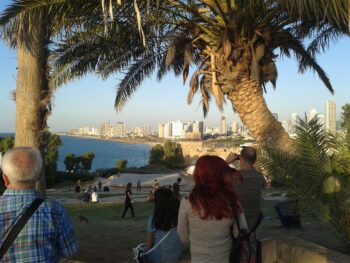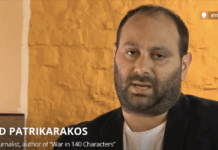By Charles Gardner —

Fresh evidence for the absolute reliability of God’s word is now enshrined in the truly amazing testimony of three courageous Jewish sisters.
Their remarkable story – how they emerged as virtual skeletons from the Holocaust nightmare to play a key role in building modern Israel – is powerfully documented in a new book by Australian author Heather Morris, hot on the heels of her best-selling account of The Tattooist of Auschwitz.
Although not intending to back up any particular theological line, Three Sisters (Zaffre, 2021) is perfect testament, in my opinion, to the veracity of Ezekiel’s 2,500-year-old prophecy predicting both the Holocaust and the miraculous rebirth of Israel.
In his Valley of Dry Bones vision, the prophet sees flesh and breath reviving skeletons and opening graves; and great men – both Christian and Jewish – have rightly interpreted the vision (in chapter 37) as a picture of the Shoah and the subsequent establishment of the state of Israel in 1948. I am referring particularly to legendary Baptist preacher Charles Spurgeon and long-serving Israeli Prime Minister Benjamin Netanyahu.
Abducted from their Slovakian home, lively teenagers Cibi and Livi Meller (Magda was only captured later) were sent to Auschwitz-Birkenau where they lived out miserable lives on starvation rations while being forced into hard labour for long hours over the next three years.
Sharing beds with lice and fleas while enduring regular bouts of fever and disease, they were reduced to skin and bone and in daily fear of not knowing whether they were going to live or die. And after over two years of being separated from their beloved mother and grandfather, they were only able to catch a brief glimpse of them as they were marched directly from the train platform to the gas chamber.
It was a living nightmare. Livi, the youngest, cried herself to sleep for ten years afterwards.
Suffering pitiless brutality on a daily basis and almost freezing to death during the harsh winters, they got used to the sight of piles of emaciated dead bodies being wheeled towards the crematoria, and were forced to watch the hanging of four young girls for plotting an act of resistance.
It’s a story of heartbreak and horror, yet also of profound hope and redemption. I wonder if we have ever truly considered the pain these Jewish people went through, though I do believe Jesus went through it all with them. You may find this a shocking comparison, but I see it as a reflection of the suffering God himself (through his Son) went through on our behalf in order that we might know life that is truly life (1 Timothy 6:19) and be redeemed from the clutches of the devil into the arms of a loving Father in a new land of promise and safety.
Indeed, the sisters eventually escaped the jaws of death to start a new life in the Promised Land. On their return from the camps, they discovered their home had been stolen from them, that anti-Semitism was still alive, and that they had fled one prison, only to be trapped in another, with communism having filled the vacuum left by the retreating Nazis in Eastern Europe.
In many ways, their story is a fulfillment of Ezekiel’s aforementioned prophecy. Cibi and Livi, who had learnt the art of construction from their Nazi tormentors as they were forced to build new barracks, were able to put this to good use as, with their bare hands, they helped to create the Jewish homeland within a few short years of their liberation.
It was reminiscent of Joseph’s experience in ancient Egypt, where he saved his people from famine despite being cruelly treated by his brothers, telling them: “You intended to harm me, but God intended it for good to accomplish what is now being done, the saving of many lives.” (Genesis 50:20)
The Meller sisters endured the curse of hell before becoming part of the resurrection experience of modern Israel, marrying and having children as they blessed the new land with their love and labors.
I pray their story will be used to stir hearts afresh with a love and tenderness for the Jewish people. I was encouraged by the reference to Christians helping to train would-be immigrants for the rigors of cultivating near-virgin territory because they understood God’s plans for Israel’s restoration. Would that Christians everywhere were as keen to back the Jewish state, surrounded on every side by enemies wishing their destruction!
When her sister Magda fell pregnant, Livi took her place as maid to the wife of Israel’s first president, Chaim Weizmann. From being a mere number among millions of despised prisoners, they were elevated to dizzy heights – again akin to Joseph’s experience in becoming Prince of Egypt after all his troubles.
In fact, both Jew and Gentile had collaborated in promoting the dream of a revived Jewish homeland. One of Israel’s greatest pioneering heroes, Weizmann played a particularly significant role by befriending evangelical Christian politician Arthur Balfour, whose subsequent declaration of solidarity with Zionism was the defining moment of Israel’s rebirth, though its full restoration has yet to be fully realized.
The physical land has been resettled, but Israelis are not yet reconnected (as a nation) with their Lord and Messiah, Jesus the Jew, who will soon reveal himself to his long-lost brothers, as Joseph did of old.



